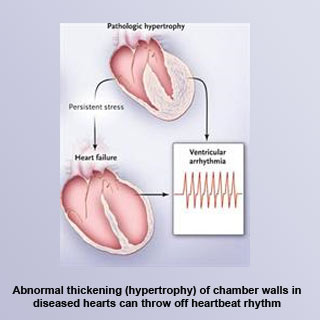
A heart failure apparently affects about 5.7 million Americans. The heart may gradually lose the capability to apparently pump with sufficient force to provide the body with blood. One cause for lost pumping strength is said to be the mass death of heart muscle cells which may be seen in several heart diseases like heart attack. Abnormal muscle growth i.e. pathogenic hypertrophy in diseased hearts may solidify chamber walls; it may slow the heartbeat and may cause potentially deadly arrhythmias. Hypertrophy is said to be a main threat issue for the increase of heart failure as well.
Latest efforts to undo hypertrophy may comprise of a new clinical trial. It looks at whether Viagra (sildenafil) may treat moderate heart failure and could decrease hypertrophy. Along with rising blood flow in arteries, Viagra may hamper with phosphodiesterases (PDEs). PDEs could break down cyclic guanosine monophosphate (cGMP), the molecular messenger that may otherwise halt the heart muscle cell growth. The brakes may be reapplied by PDE inhibitors.
Viagra may close down the PDE5 family in particular; one of the 11 PDE families in the body and that may contain apparently more than about 50 single enzymes. They have apparently established to be notably good drug targets as they all supposedly have a unique structure, tissue distribution and role. In the experiments of heart muscle cells and live mice, it was discovered that members of a second PDE family, mainly the PDE1a enzyme, may also break up cGMP to apparently regulate hypertrophy, but supposedly not in the similar method as Viagra.
Chen Yan, Ph.D., associate professor within the Aab Cardiovascular Research Institute (CVRI) at the University of Rochester Medical Center, and corresponding author for the study, commented, “We found a new drug target that prevents hypertrophy when interfered with by known compounds, and are already developing drug candidates based on the discovery.â€
Whether combination treatments with PDE1 inhibitors are of importance to heart failure may not be apparent until further studies are finished. Both PDE1 inhibitors and Viagra may bring down blood pressure, and may or may not lower it a lot in combination. Viagra apparently may not be used with nitroglycerin for this purpose. At the same time, few patients with heart failure may not be able to use beta blockers, which could also decrease hypertrophy, as these drugs apparently make already weak hearts pump with less energy. Combining beta blockers with PDE1 inhibitors could probably allow heart failure patients to take fewer beta blockers, thereby shielding the contractile power of their heart muscle cells while still preventing hypertrophy.
Usually, cGMP-dependent signaling may curb abnormal growth in heart cells by limiting Ca2+ signals that drive hypertrophy. It may be believed that PDE signaling unbalanced by long-term damage on heart muscle may deform the ‘crosstalk’ between Ca2+ and cGMP, so as to encourage abnormal growth.
It was also discovered that the mixture of IC86340 and Viagra in isolated heart muscle cells may remove hypertrophy to a larger extent than either compound alone. Cell growth was said to be calculated by methods that apparently confines every cell’s protein production and the size of cells in terms of their surface region.
Yan mentioned, “Almost every signaling molecule involved in PDE-regulated hypertrophy in the heart – including nitric oxide, calcium and angiotensin II – is at the core of regulating blood pressure and disease-related structural changes in arteries. PDE1a levels appear to influence those pathways in return, which creates the potential for PDE1 inhibitors that treat both hypertrophy in the heart and vascular diseases like hypertension and atherosclerosis.â€
Yan’s lab is now concentrating on exposing the function of several phosphodiesterases in atherosclerosis and hypertension as well as in heart failure.
This study is published in the journal Circulation Research.
